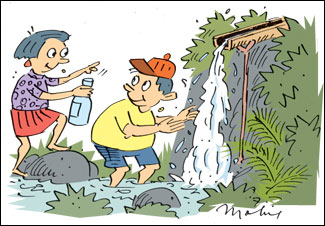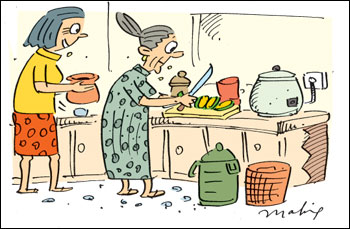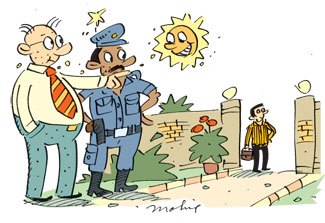|

by R. S. Karunaratne
Many uses of 'with'
in speech
'With' is a preposition that means 'accompanying'.
1. We use 'with' to talk about the features that somebody or
something has.
Do you know the boy with long hair?
|

Can you fill this bottle with
water? |
We live in a house with a big garden.
A dog with a bushy tail followed her.
An elephant with two long tusks carried the
casket of relics.
A man with a long beard pushed a cartfull of ripe mangoes.
2. We use 'with' to say who or what accompanies something.
She was dancing with her friends.
What shall I bring with me?
With whom did you come?
I cannot go with him.
My aunt came home with a lot of gifts.
3. We use 'with' to talk about what you use to
do something.
Can you fill this bottle with water?
The tank was filled with petrol.
Magampura harbour is filled with sea water.
The lake was filled with rain water.
Fill the tube with chemicals.
4. We use 'with' to talk about doing things
together.
I fully agree with you.
She works with orphans.
I used to work with some foreigners.
Narmada left her job because she could not work with some of her
superiors.
Even a devil cannot work with him.
(colloquial)
5. Some verbs are always used with
the word 'with'
The work was done in collaboration
with China.
I want to discuss something with you.
Don't play with stray animals .
Can you share this cake with your friends?
|

She helped her mother with
the cooking. |
Do you still speak with him?
We use 'with' to talk about doing things competitively.
She always fights with her colleagues.
Stop arguing with your mother.
No one can compete with him.
Union leaders clashed with the police.
I disagree with you on two counts.
Oh, you're still struggling with the problem!
We use 'with' to talk about giving assistance.
She helped her mother with the cooking.
Give me a hand with colour washing.
I will assist you with adequate funds.
8. We use 'with' to talk about what happens at the beginning or end
of something.
The meeting began with the Natonal Anthem.
The meal ended with fruit salad and ice cream.
The proceedings concluded with the vote
of thanks.
9. We use 'with' to talk about emotional or
physical states.
On hearing the results, she jumped up with excitements.
He walked on the live coal with trepidation.
10. We use 'with' to talk about how people behave because of what
they feel.
The little boy was shivering with fear.
11. Some verbs are usually followed by 'with'.
The car collided with a bouser.
Never try to keep up with your neighbours.
If you interfere with my work, I'll leave.
Can you check with the Immigration Department?
12. Some nouns are often followed by 'with'.
I have no sympathy with those who damage
public property.
Some Portuguese officials had a close relationship with the King of
Kotte.
The woman had an argument with a bus conductor.
I have an appointment with the surveyor general.
Do you have any trouble with your neighbours?
I don't have much contact with him.
Current English usage
English is a living language and it is subject to change. In this
column the latest trends in English usage are highlighted.
1. Datum and data
Data means 'body of information'. In computing it is used as a
collective noun and is frequently used with a singular verb.
The data is necessary for my research. Datum, the singular form, is
hardly used in modern English.
2. Dates
Dates are usually written in figures except in legal documents. In
British English the date is followed by the month and the year. 28
November 2010. In American English the standard form is November 28
2010. Care should be taken when writing the date in figures. Eg.
28.11.2010. In American English this will be 11.28.2010.
Centuries are written either in figures or in words: 'The 21st
century' or 'the twentyfirst century'. Decades and centuries are written
without apostrophes. Eg. He was born in the 1980s.
3. Deadly and deathly
Deadly means likely to cause death.
The robber dealt John a deadly blow with a heavy club. Deathly means
'resembling death'.
On seeing the armed man she turned deathly pale.
4. Decimate
Decimate is 'to kill one in ten'. In ancient Rome every tenth soldier
was killed as a punishment for mutiny. However, in modern English
decimate means 'to kill or destroy a large part of'. Malaria decimated
the population in ancient Sri Lanka.
5. Defective and deficient
Defective means 'having a fault or not working properly. I have to
wear spectacles because my eyesight is defective. The second-hand
motorcycle he bought is now defective. Deficient means 'lacking in'.
Some young graduates are deficient in language skills.
6. Delivery and deliverance
Delivery means 'the act of delivering letters or any other goods'.
There is no delivery of mail on Poya days. Deliverance means 'rescue or
save'. We thanked the police for the child's deliverance from the
kidnappers.
7. Delusion and illusion
Delusion means 'a false idea or belief'. Sama is under the delusion
that she is very beautiful. Illusion means a false or misleading
impression'. If you see water in a desert, it is an optical illusion.
8. Demise
In formal English demise means 'death'. He was grieving over the
demise of his wife. In modern English demise also means 'the ending of
an activity'. The demise of the hydraulic civilization is an important
event in history.
Starters :
Know your 'WH-questions'
'WH-Questions' always begin with a wh-word.
The wh-words are as follows:
Who, whom, whose, what, which, where, when, why and how. Although
'how' does not begin with 'wh', it is considered a 'wh-word'. 'Wh-words'
are also known as interrogative words or question words. All wh-words
are usually used to ask questions.
Who
Who is that man waiting at the gate?
Who will give me a loan of Rs. 1,000?
|

Who is that man waiting at the gate? |
Who is your English teacher?
Who took my pen?
Who defaced this wall painting?
Whom
Julia, Whom I first met at Kelaniya University, is going abroad
tomorrow.
Whom do you want to speak to?
From whom is that letter?
The letter was titled 'To whom it may concern'.
Whose
Whose umbrella is this?
Martin whose father had died in an accident came to see me.
Whose books are you taking away from the class?
Whose idea was that?
I can't remember whose names were on the notice board.
Whose land are we on?
Whose is not restricted to people. It can be used with animals and
things.
Elephants, whose tusks are long, are called tuskers.
This is the car whose window was broken.
What
What's your name?
What a pity!
What was it?
Which
Which country did he come from?
Which students are wearing white shirts?
Which student wrote this essay?
Which is the longest river in Sri Lanka?
Which town is that?
Where
Where are the police headquarters?
Where is the drummer?
Where did you buy this shirt?
Where are they going?
Where are we now?
When
When did they come?
When did Mandela become
the President of South Africa?
When is your birthday?
When is he coming from India?
Why
Why don't you come with me?
Why are you so happy today?
Why did the Portuguese come to Sri Lanka?
Why are you laughing?
How
How are you getting on?
How did this happen?
How many chairs are there in the classroom?
How much did he steal?
How is your headache now?
Activity
Complete the following sentences with question words. Check your
answers with the key.
1. .......... is your maths teacher?
2. .......... are the boys?
3. .......... did he want?
4. .......... don't you come home?
5. .......... is the hospital?
6. .......... students are going to India?
7. .......... did Soma go home?
8. .......... didn't he finish the job on time?
9. .......... is your mother unhappy today?
10. ......... can I meet you?
**********
[Key ]
1. Who 2. Where 3. What 4. Why 5. Where 6. Which 7. How 8. Why 9. Why
10. When/Where
********** |

